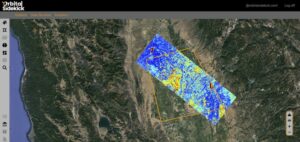“Temasek is a great foothold within the Asia Pacific region,” Daniel Katz, Orbital Sidekick CEO and co-founder, told SpaceNews. “Like any other space company, one of our value propositions is serving clients on a global scale.”
After closing the $16 million investment round, Orbital Sidekick has completed the conditions for receiving another $16 million in U.S. Air Force funding.
In October, the San Francisco startup announced the $16 million award from the U.S. Air Force commercial investment group AFVentures’s Strategic Financing program to support the launch of its six-satellite Global Hyperspectral Observation Satellite constellation, known as GHOSt. Orbital Sidekick plans to begin launching GHOSt satellites in late 2021 on SpaceX Falcon 9 flight.
In addition to Temasek, Energy Innovation Capital and Syndicate 708 provided funding for Orbital Sidekick alongside existing investors Allied Minds and 11.2 Capital.
Because Orbital Sidekick’s lead investor Temasek is Singapore-based, the investment was reviewed by the Committee on Foreign Investment in the United States, an interagency panel led by the treasury secretary to examine investments with potential impacts on national security.
Although that review took time, Orbital Sidekick sees great benefit in its relationship with Temasek, an investment firm with a $300 billion portfolio and an emphasis on Environmental, Social and Governance (ESG) investment.
“Temasek takes ESG seriously and we take that seriously, too,” Katz said.
Orbital Sidekick works, for example, with energy companies to detect and monitor pipeline leaks.
“We can see subtle changes in reflectance and absorption features in the environment,” Katz said.
Around underground pipelines, soil, vegetation and water reflectance changes in response to fuel leaks. Orbital Sidekick also plans to work with energy companies to directly detect oil and gas leaks.
Orbital Sidekick has established partnerships to conduct pilot programs with organizations including Phillips 66 and the Intelligent Pipeline Integrity Program, a partnership managed by the Energy & Environmental Research Center at the University of North Dakota.
“The energy and industrial sectors are under intense pressure to achieve ESG excellence,” Christopher Smith, Energy Innovation Capital managing director, said in a statement. “Meeting increasing social and regulatory expectations requires persistent and sophisticated asset and environmental monitoring. Orbital Sidekick’s Spectral Intelligence uniquely delivers hyperspectral imaging from space, allowing operators to monitor assets beyond the visual spectrum, across the globe, on a daily frequency.”
Orbital Sidekick also expects growing demand for information related to regional wildfire risk, global emissions, mineral detection and clean energy exploration.



